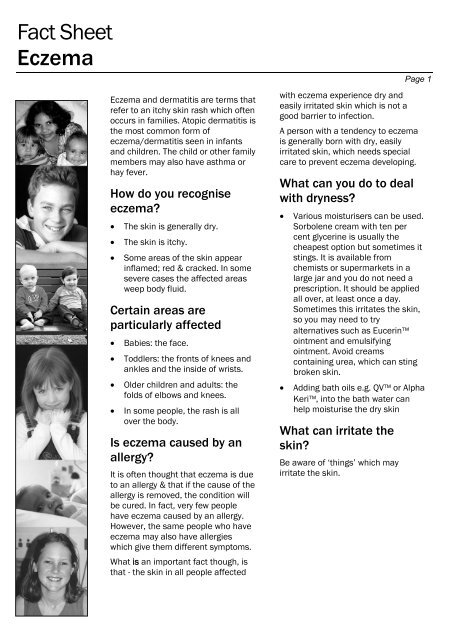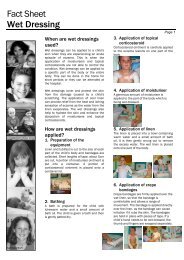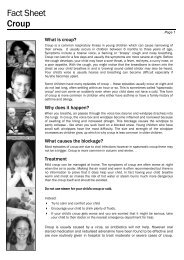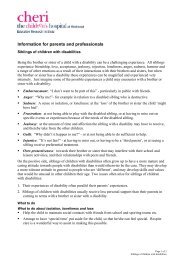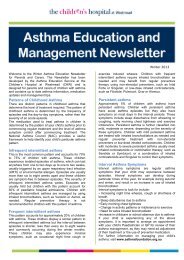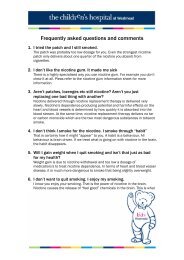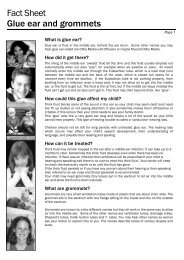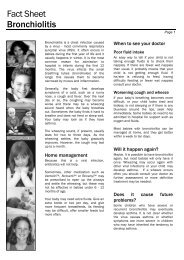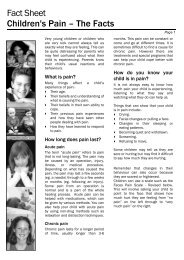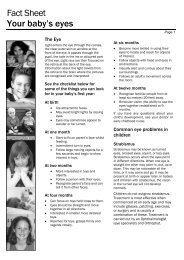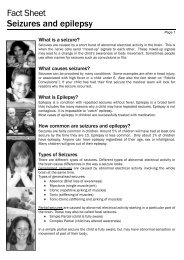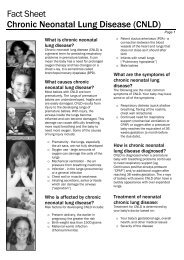Fact Sheet Eczema - Kids Health @ CHW
Fact Sheet Eczema - Kids Health @ CHW
Fact Sheet Eczema - Kids Health @ CHW
You also want an ePaper? Increase the reach of your titles
YUMPU automatically turns print PDFs into web optimized ePapers that Google loves.
<strong>Fact</strong> <strong>Sheet</strong><br />
<strong>Eczema</strong><br />
xcvxcvxcv<br />
<strong>Eczema</strong> and dermatitis are terms that<br />
refer to an itchy skin rash which often<br />
occurs in families. Atopic dermatitis is<br />
the most common form of<br />
eczema/dermatitis seen in infants<br />
and children. The child or other family<br />
members may also have asthma or<br />
hay fever.<br />
How do you recognise<br />
eczema?<br />
• The skin is generally dry.<br />
• The skin is itchy.<br />
• Some areas of the skin appear<br />
inflamed; red & cracked. In some<br />
severe cases the affected areas<br />
weep body fluid.<br />
Certain areas are<br />
particularly affected<br />
• Babies: the face.<br />
• Toddlers: the fronts of knees and<br />
ankles and the inside of wrists.<br />
• Older children and adults: the<br />
folds of elbows and knees.<br />
• In some people, the rash is all<br />
over the body.<br />
Is eczema caused by an<br />
allergy?<br />
It is often thought that eczema is due<br />
to an allergy & that if the cause of the<br />
allergy is removed, the condition will<br />
be cured. In fact, very few people<br />
have eczema caused by an allergy.<br />
However, the same people who have<br />
eczema may also have allergies<br />
which give them different symptoms.<br />
What is an important fact though, is<br />
that - the skin in all people affected<br />
with eczema experience dry and<br />
easily irritated skin which is not a<br />
good barrier to infection.<br />
A person with a tendency to eczema<br />
is generally born with dry, easily<br />
irritated skin, which needs special<br />
care to prevent eczema developing.<br />
What can you do to deal<br />
with dryness?<br />
Page 1<br />
• Various moisturisers can be used.<br />
Sorbolene cream with ten per<br />
cent glycerine is usually the<br />
cheapest option but sometimes it<br />
stings. It is available from<br />
chemists or supermarkets in a<br />
large jar and you do not need a<br />
prescription. It should be applied<br />
all over, at least once a day.<br />
Sometimes this irritates the skin,<br />
so you may need to try<br />
alternatives such as Eucerin<br />
ointment and emulsifying<br />
ointment. Avoid creams<br />
containing urea, which can sting<br />
broken skin.<br />
• Adding bath oils e.g. QV or Alpha<br />
Keri, into the bath water can<br />
help moisturise the dry skin<br />
What can irritate the<br />
skin?<br />
Be aware of ‘things’ which may<br />
irritate the skin.
<strong>Fact</strong> <strong>Sheet</strong><br />
<strong>Eczema</strong><br />
xcvxcvxcv<br />
Try to avoid these.<br />
• Some materials, especially wool<br />
and acrylic (carpets, furniture, car<br />
seats and stroller covers as well<br />
as clothes). House dust mite in<br />
carpets can irritate some children.<br />
• Sand.<br />
• Perfumed and 'medicated'<br />
products.<br />
• Bubble baths.<br />
• Using soap - for the most soiled<br />
areas, sorbolene cream can be<br />
used instead of soap.<br />
• Chlorine in pools.<br />
• Rapid changes of temperature<br />
• Active exercise to the point of<br />
sweating.<br />
• Food allergies.<br />
• Dry air eg. heated rooms in winter,<br />
air conditioning in summer.<br />
Not all these ‘things’ will irritate all<br />
children with eczema, but try to<br />
become aware of what can cause<br />
irritation for your child’s skin. That<br />
way you can avoid it, & avoid a ‘flair<br />
up’.<br />
Food allergy<br />
If any foods seem to provoke a<br />
reaction, it may have to be taken out<br />
of the diet. It is best to check with a<br />
dietitian to make sure your child is<br />
not missing out on essential vitamins<br />
and minerals for growth.<br />
What can be done if<br />
eczema develops?<br />
If eczema develops, continue regular<br />
moisturising and avoid anything<br />
which further irritates the skin.<br />
Page 2<br />
Cortisone preparations will be<br />
prescribed to treat affected areas of<br />
eczema. These are safe as long as<br />
they are used as directed, and only<br />
used sparingly on those areas<br />
affected. It is alright to apply them to<br />
broken skin. You can stop using them<br />
when the eczema settles down.<br />
Most cortisone creams are best used<br />
twice a day on the affected areas.<br />
Some stronger preparations, which<br />
are rarely required, are used only<br />
once a day. It is important to follow<br />
the instructions carefully. In general,<br />
cortisone creams are better used in<br />
ointment bases (clear, greasy) rather<br />
than in cream bases (white) because<br />
the ointments are more moisturising.<br />
Some formulations are not suitable<br />
for the face or the nappy area. Read<br />
all labels carefully<br />
If the eczema is very severe and is<br />
not responding to treatment at home,<br />
a period of intensive treatment in<br />
hospital with wet dressings will<br />
usually ease the condition. Cortisone<br />
tablets should not be used.<br />
Is infection a risk?<br />
Children with eczema often develop<br />
severe infections from the herpes<br />
simplex virus - the same virus that<br />
causes cold sores. People with cold<br />
sores should not be allowed to kiss<br />
your child. There is no special<br />
problem with other viruses and the<br />
usual childhood immunisations are<br />
safe.
<strong>Fact</strong> <strong>Sheet</strong><br />
<strong>Eczema</strong><br />
xcvxcvxcv<br />
Impetigo, a bacterial infection, can<br />
occur on top of the eczema. This will<br />
need antibiotic medicine. Do not use<br />
disinfectants - they will only irritate<br />
the skin further.<br />
Remember<br />
• <strong>Eczema</strong> cannot be cured but it<br />
can usually be controlled.<br />
• Avoid things which irritate the<br />
skin.<br />
Page 3<br />
This fact sheet is for education purposes only.<br />
Please consult with your doctor or other health professional<br />
to make sure this information is right for your child. This document was reviewed on 19 th March 2010<br />
www.chw.edu.au www.sch.edu.au www.kaleidoscope.org.au<br />
© The Children’s Hospital at Westmead, Sydney Children’s Hospital, Randwick & Kaleidoscope * Hunter Children’s <strong>Health</strong> Network – 2005-2010


